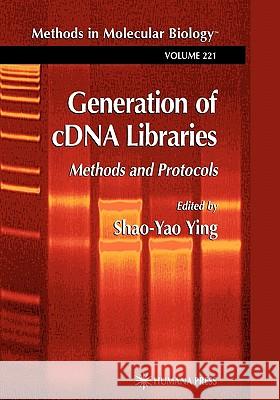Generation of Cdna Libraries: Methods and Protocols » książka
Generation of Cdna Libraries: Methods and Protocols
ISBN-13: 9781617373336 / Angielski / Miękka / 2010 / 338 str.
Since its invention and subsequent development nearly 20 years ago, po- merase chain reaction (PCR) has been extensively utilized to identify numerous gene probes in vitro and in vivo. However, attempts to generate complete and full-length complementary cDNA libraries were, for the most part, fruitless and remained elusive until the last decade, when simple and rapid methods were developed. With current decoding and potential application of human genome information to genechips, there are urgent needs for identification of functional significance of these decoded gene sequences. Inherent in bringing these app- cations to fruition is the need to generate a complete and full-length cDNA library for potential functional assays of specific gene sequences. Generation of cDNA Libraries: Methods and Protocols serves as a laboratory manual on the evolution of generation of cDNA libraries, covering both ba- ground information and step-by-step practical laboratory recipes for which p- tocols, reagents, operational tips, instrumentation, and other requirements are detailed. The first chapter of the book is an overview of the basics of generating cDNA libraries, which include the following: (a) the definition of a cDNA library, (b) different kinds of cDNA libraries, (c) differences between methods for cDNA library generation using conventional approaches and novel stra- gies, including reverse generation of RNA repertoires from cDNA libraries, and (d) the quality of cDNA libraries.











